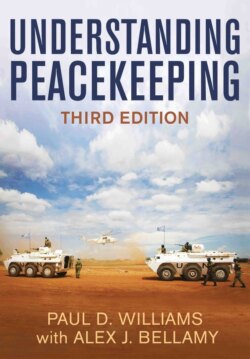Читать книгу Understanding Peacekeeping - Alex J. Bellamy - Страница 18
1 Peace Operations in Global Politics
ОглавлениеThis chapter analyses the relationships between peace operations and global politics. Initially, peacekeeping was concerned mainly with creating the conditions for states to settle their disputes peacefully. Over time, as interstate war diminished and the frequency of civil wars within states increased, peace operations were used more frequently to maintain peace within states and sometimes to influence domestic structures in order to turn war-torn territories into peaceful democratic societies. Whereas the Westphalian order rested on a notion of sovereignty that granted states protection from interference by outsiders, the post-Westphalian account conceived of sovereignty as entailing responsibilities, especially for the protection of their populations from atrocity crimes such as genocide and crimes against humanity. As the number and scope of peace operations informed by the post-Westphalian approach has grown, so too has the number of theories and conceptual frameworks used to understand them.
To address these issues, this chapter starts by summarizing the basic principles of the Westphalian and post-Westphalian conceptions of international order and the respective role of peace operations within them. The second section then presents different ways of theorizing peace operations and five prominent theoretical approaches that offer insights into the roles that peace operations play in global politics. Finally, we note the conclusions of existing scholarship about the overall impacts peace operations have had on trends in armed conflict.
